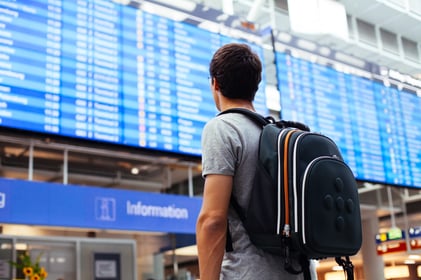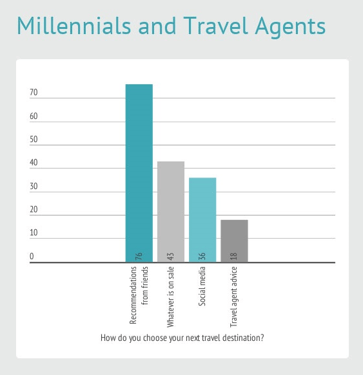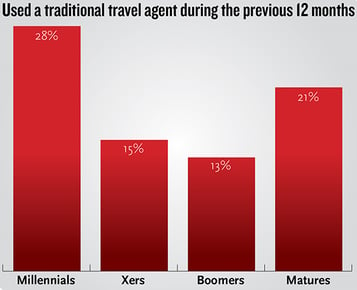Based on the frequency of articles focused on millennials over the past two years it’s apparent the travel industry views them as an important demographic. T hat’s not surprising, the Baby Boomer generation is retiring – perhaps gaining more time for travel but likely with less disposable income to pay for it. Millennials, on the other hand, are entering the workforce and starting to climb the income ladder. As was the case with the Boomers, these Millennials might have limited travel budgets at the moment, but they’re likely to transform into a lucrative age group for travel agencies over the next ten years.
hat’s not surprising, the Baby Boomer generation is retiring – perhaps gaining more time for travel but likely with less disposable income to pay for it. Millennials, on the other hand, are entering the workforce and starting to climb the income ladder. As was the case with the Boomers, these Millennials might have limited travel budgets at the moment, but they’re likely to transform into a lucrative age group for travel agencies over the next ten years.
The challenge for every sector of the travel industry, from tour operators to the travel agency, is that purchasing patterns for millennials are very different from Boomers. Having grown up with technology, this group is comfortable with online apps – particularly social media - and aggressively uses them during retail transactions.
This use of online apps and social media means millennials are affected by a broad range of influences during their buying decisions. For skeptics, any trip to the mall will reveal surprising numbers of young people sharing photos of merchandise with friends before making decisions about what to buy and what to leave in the dressing room.
Travel Agents face a Changing Role
Where does this leave the travel agent? Certainly the agent is in a much more precarious position than before the onslaught of technology. Prior to online content, social media and instant messaging, the agents held a gatekeeper role with travelers. Only other agents could match their control of travel knowledge and information. The loss of this gatekeeper status is dramatically portrayed in this graphic from Topdeck Travel: only 18% of Millennials sought an agent’s advice about travel destinations!
Additionally, the independence of millennial travelers has been reinforced by a wave of complementary travel technology: travel apps, products and services which empower every traveler to chart their own course and make their own decisions. This technology, combined with online travel bookings, has undercut the full service agency. Their agents, formerly regarded as specialists holding an edge in expertise, appear to be in danger of becoming anachronisms.
However, there’s another point of view in the travel industry about where technology is taking millennials - and how travel agencies can win back their business. This perspective says the way to reverse current trends is to focus on two travel agent advantages that have survived amidst all the new travel technology: time and expertise.
Convenience: Millennials are possibly the busiest generation yet and their overscheduled lifestyle means they’re always looking for – and value - shorter, quicker, and more convenient ways to get things done. Travel, particularly the unique, innovative, experiential type millennials find attractive, takes time for an amateur traveler to plan. A smart travel agency positions itself as the convenient option this generation is looking for – particularly using innovations like travel apps for mobile interactions.
Expertise: Yes; millennials can be self-confident and independent, but this is also the generation that launched YouTube videos with tutorials on everything from fixing headlight to building bookshelves. They know when to seek experienced guidance and heed advice. This generation will value advice from an agent, particularly when they take the time to learn what their customer is most excited about experiencing in their travel. This graph from MMGY Global shows that regaining an advisory role is a very real possibility. 
This mix of convenience and expertise can be the ticket for travel agency success, but only if management and the travel agents are committed to exchanging the timeworn and ineffective transactional model for an innovative end-to-end travel experience. One good place to start is upgrading the agent’s role to one closer to that of an advisor or even concierge. Fairly or not, many millennials view the agent’s place in their travel transaction as a cost-add rather than a value-add.
On the other hand, they value those who can conveniently supply valuable information and do with the goal of building a long term association and becoming a trusted adviser. For this age group, the hallmark of a trusted adviser is a close working relationship. This means the agent must be accessible by text or cell call throughout their trip – not just for the upfront planning and booking.
In order for a travel agency to effectively implement this approach, they need to educate their agents on a unique differentiator they bring to their customers. While there’s a great deal of available travel information available online, the majority of that content is created by specific travel sectors such as hotels, airlines, tour operators and cruises. An individual wishing to recast this tightly focused information so that it becomes a well-integrated, exciting, travel experience faces a difficult and time-consuming task.
Travel agents can establish themselves as an expert and trusted advisor through their ability to collect the less obvious and more diffuse information that spells the difference between a very ordinary trip and one that creates memories. Then, when the millennial traveler expresses what they what to find in a travel destination, agents can immediately differentiate themselves from what passes for deep travel knowledge online. It all comes down to value, something millennials look for just as much as every generation before them.
















